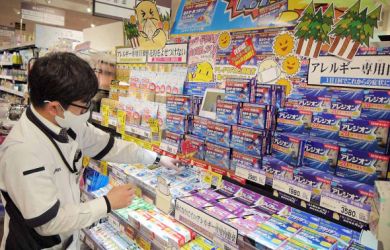
October 7, 2011
Public Enemy #1
Antismoking proposals are stubbed out by the government-big business alliance
By Metropolis
Originally published on metropolis.co.jp on October 2011


For Japanese fashion designer Juri Satou, who recently moved to New York City, recently-passed laws there banning smoking in city parks, beaches, and other public spaces took her by surprise. “Lots of people ignore the laws, risking the $50 fine,” she told Metropolis. “Anyway, you can smoke when you’re walking on the street. It’s strange! But for me, the most annoying thing is that I can’t smoke in nightclubs.”
Yet in Japan, these rules are inversed—smoking is highly regulated in public spaces, but a practical free-for-all indoors. This can cause horror in visiting nonsmokers, or pleasure for those tobacco fiends among us.
“It all harks back to a decision made in 2002 by Chiyoda Ward, Tokyo, penalizing smoking in busy areas,” begins Dr. Manabu Sakuta, chairman of the Japan Society for Tobacco Control (JSTC). Established in 2003, the JSTC is an NGO comprised mostly of health and legal professionals, which boasts tobacco industry whistleblower Dr. Jeffrey Wigand (The Insider) as honorary advisor. Chiyoda’s law, the first of its kind, classified 25 percent of the ward as nonsmoking, including the surroundings of Akihabara and Ochanomizu stations.
“Governments realized it was easier to enforce smoking laws in public spaces, and Japan Tobacco [JT] has lobbied vigorously against changes being made to smoking laws in restaurants and pubs,” adds JSTC executive secretary Kyoichi Miyazaki.
A telling example is that of Kanagawa Prefecture, whose April 2010 law banning smoking in public facilities such as hotels, restaurants and pubs, was watered down after an outcry. In the end, the provision of nonsmoking areas was allowed in place of a total ban.
“JT created a scare campaign and told restaurant owners that they would lose customers if they became nonsmoking,” says Miyazaki. He goes on to cite figures disproving this claim. Newly nonsmoking venues even stand to gain new customers—for example from families. “We’ve heard that even smokers appreciate the taste of food in nonsmoking restaurants!” Miyazaki laughs.
Government involvement
In a country where the Ministry of Finance controls a majority stake in Japan Tobacco and determines all tobacco business policies, it’s no surprise that further nonsmoking legislation is difficult to pass. Add the Tobacco Business Law of 1984, created to “promote the sound development of the Japanese tobacco industry,” and it’s no surprise the JTSC’s lobbying doesn’t get very far.
Though the Democratic Party of Japan (DPJ) calls for abolishing the Tobacco Business Law, which allows the government to own more than half of Japan Tobacco’s outstanding shares and recommends that tobacco-related issues be included in the health portfolio, the Finance Ministry is extremely reluctant to let go of its money. One of JTSC’s aims is to move tobacco jurisdiction from the Finance Ministry to the Health Ministry. Doesn’t sound like a bad idea.
Although Japan signed and ratified the WHO’s Framework Convention on Tobacco Control (FCTC) in 2004, it was successful in passing through amendments. In turn, the JSTC has submitted its own bills—four of them to be exact—as proposed amendments to the Tobacco Business Law.
But don’t expect too much change from a government that only acknowledged the health risks of smoking in 1987, when antismoking groups convinced WHO to sponsor a global tobacco conference in Tokyo. Discussions that the Finance Ministry sells its stake in Japan Tobacco (also part of the DPJ manifesto) might be the only hope, though this plan would need the support of opposition parties to go ahead.

Beating The bad guys
Both the DPJ and rival party the Liberal Democratic Party (LDP) have connections with the tobacco industry or unions, whose income they claim to be in favor of protecting. Though proposed antismoking legislation contains provisions to find alternative crops for tobacco farmers in order to safeguard their livelihood, JT’s aggressive international outsourcing proves that protecting local industry is not what is really at stake here. Farms in Japan supply a third of JT’s tobacco needs, with the rest sourced from Africa, India and other countries.
Domestically, JT is active on a corporate social responsibility level, though this tends to lend an extra perversity to their insidious methods. Miyazaki tells of when he was asked to give a talk for a heart disease foundation at a JT-funded university in Shibuya.
The Tax Commission held hearings during September to discuss ways in which to raise funds for reconstruction in the wake of the March 11 earthquake and tsunami, as well as how to ameliorate the nation’s ballooning public debt and social welfare costs. Health Minister Yoko Komiyama said tobacco taxes should be raised until the average price for a pack of cigarettes is about ¥700 or 75 percent more than now—to help with medical costs. Naturally the JSTC wholeheartedly supports this measure. Komiyama also tabled the idea of increasing tobacco levies by ¥100 annually for three years.
In the end, it might well be the pocket that is the most effective antismoking measure of all. In an October 2010 Dimsdrive Research survey, 31.3 percent of respondents said they would quit smoking if a packet of cigarettes cost between ¥701 and ¥999.
smoke stats
- No. of people who smoke in Japan: nearly 30 million
- Percentage of men: 43%
- Percentage of women: 13%
- Percentage of Japan Tobacco controlled by the Finance Ministry: 50.2 %
- JT’s yearly profit: nearly $3 billion
Source: Al Jazeera
- No. of cigarettes consumed per year: around 350 billion
- Per capita cigarette consumption per year: 2770 cigarettes
- Average cost of pack: ¥420
- Current revenues from tobacco in Japan: around ¥2.3 trillion
- Tobacco tax per year: about ¥1.5 trillion
- Percentage of govt. total revenue: 3%
Source: http://factsanddetails.com
anti up
Non- and antismoking groups and resources
Japan Society for Tobacco Control
30-5-201 Ichigaya-Yakuoji
Shinjuku-ku, Tokyo
Email: desk@nosmoke55.jp
www.nosmoke55.jp
MASH (Metropolitan Association on Smoking or Health)
2-1-4-203 Iidabashi, Chiyoda-ku, Tokyo. Tel: 03-3222-6781. Email: clean_air_jp@yahoo.co.jp.
www.nosmoke-shutoken.org
Saitama citizens’ Meeting for Health and Nonsmoking
Contact: Yukio Soneda. Tel: 048-654-7422.
www.ne.jp/asahi/saitama/tabako
TMKC (Chiba citizens’ nonsmoking group)
Contact: Yoichi Shimasaki. 301-59, Maekaizukacho, Funabashi-shi, Chiba. Email: yo-smzk@nifty.com.
http://homepage3.nifty.com/tmkc-island
Tobacco Problems Information Center (TOPIC)
TOPIC holds regular meetings, with themes including how to encourage nonsmoking; changes needed to combat Japan’s cigarette problem; analysis of tobacco-related media; passive smoking and health-related issues, etc.
Contact: Bungaku Watanabe. 2-1-4-203 Iidabashi, Chiyoda-ku. Tel: 03-3222-6781.
Email: bungakuw@ybb.ne.jp.
Next meeting: Fri, October 21, 6:30-8:30pm. Fujimi Citizens’ Hall, 1-6-7, Fujimi, Chiyoda-ku. 03-3263-3841. Closest station: Iidabashi. Entry ¥300, ¥200 (students).







